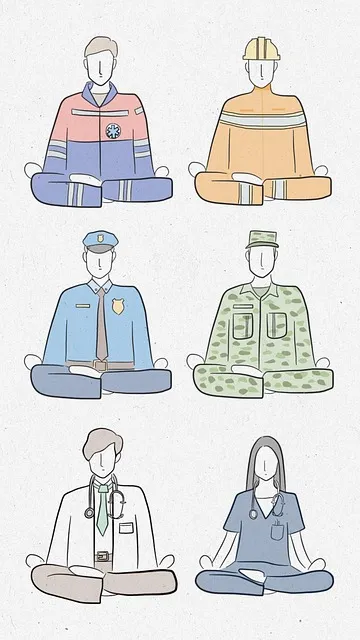Developing a successful mental health app requires balancing technology with care, addressing specific domain needs like those offered by Kaiser Lone Tree's services and programs. Collaboration with professionals ensures accuracy, integrating evidence-based practices while catering to diverse wellness needs. This reduces stigma, promotes inclusivity, and enhances accessibility to mental health services through technology. By combining digital tools with strategies like Mind Over Matter and Empathy Building, Kaiser Lone Tree's app provides personalized support for stress management and self-confidence building. Technology integration expands access, benefits users facing barriers, and facilitates early mental illness detection. Strict ethical guidelines and privacy protection are crucial for user trust and encouraging individuals to seek services through Kaiser Lone Tree.
In today’s digital age, mental wellness apps are transforming access to crucial services. This comprehensive guide delves into the development of these innovative tools, highlighting strategies like those employed by Kaiser Lone Tree to unlock mental health support. We explore app features enhancing user engagement while emphasizing ethical considerations and privacy protection. Understanding these aspects is vital for creating effective solutions that enable folks to navigate a labyrinthine landscape of care, fostering better mental health outcomes. Discover how technology revolutionizes mental wellness and ensures a safe, supportive environment.
- Understanding Mental Health App Development: A Comprehensive Guide
- Kaiser Lone Tree: Unlocking Access to Mental Health Services
- Integrating Technology: Features and Benefits for User Engagement
- Ethical Considerations and Ensuring User Privacy in Mental Wellness Apps
Understanding Mental Health App Development: A Comprehensive Guide

Developing a mental health app is a comprehensive guide that involves understanding the nuances of both technology and mental wellness. It’s about crafting tools that not only offer accessible resources but also contribute to breaking down barriers, such as the stigma associated with mental illness. The process begins by identifying specific needs within the mental health domain, whether it’s providing an easy way to access Kaiser Lone Tree’s services or developing Inner Strength Development programs.
App developers must collaborate closely with mental health professionals and experts to ensure the accuracy and effectiveness of content. This includes integrating evidence-based practices while keeping in mind the diverse nature of mental wellness needs. Through such efforts, apps can foster Mental Illness Stigma Reduction Efforts, ultimately promoting a more inclusive environment for those seeking support. By combining technology and care, developers play a pivotal role in enhancing accessibility to mental health services.
Kaiser Lone Tree: Unlocking Access to Mental Health Services

Kaiser Lone Tree stands as a beacon of hope for individuals seeking accessible mental health services. This innovative approach by Kaiser aims to unlock and provide support for those in need, ensuring no one is left behind in their journey towards better mental wellness. By integrating digital tools and resources, they offer a user-friendly platform that makes accessing care convenient and confidential.
The app, designed with the latest technology, enables users to connect with professionals who employ evidence-based Mind Over Matter Principles and Empathy Building Strategies. This comprehensive approach caters to diverse needs, whether it’s managing stress, anxiety, or simply building self-confidence. Through interactive features, users can engage in activities that promote mindfulness, set personal goals, and track their progress, all while receiving expert guidance tailored to their unique experiences.
Integrating Technology: Features and Benefits for User Engagement

The integration of technology in mental wellness apps offers a promising approach to enhancing user engagement and access to mental health services, such as those provided by Kaiser Lone Tree. These apps can facilitate self-care practices by incorporating interactive features that cater to diverse needs. For instance, users can benefit from personalized meditation sessions, mood tracking tools, and virtual therapy rooms, all accessible on their mobile devices. This accessibility is particularly valuable for individuals who may face barriers in accessing traditional mental health services or prefer the convenience of digital solutions.
By leveraging technology, mental wellness apps also enable risk assessment for mental health professionals through advanced algorithms that analyze user data. This not only aids in early detection of potential mental illness but also contributes to stigma reduction efforts by promoting a more proactive and inclusive approach to mental health care. Users can receive timely interventions and support, fostering a sense of community and reducing the social isolation often associated with mental illness.
Ethical Considerations and Ensuring User Privacy in Mental Wellness Apps

Mental wellness apps have gained significant traction as a means to provide accessible mental health services, but their development must adhere to stringent ethical guidelines and prioritize user privacy. As more people turn to digital platforms like Kaiser Lone Tree for help with stress management, resilience building, and anxiety relief, ensuring data security becomes paramount. Developers must implement robust encryption protocols to safeguard personal and sensitive information shared by users.
Transparency is another key aspect; apps should clearly communicate data usage practices and provide users with control over their privacy settings. Given the intimate nature of mental health content, user consent and awareness are crucial. By adhering to ethical standards and prioritizing privacy, developers can foster trust, encouraging individuals to seek assistance for their mental wellness needs effectively.
Mental wellness app development is a powerful tool to enhance access to care, as demonstrated by Kaiser Lone Tree’s innovative approach. By integrating technology, these applications offer personalized support and resources for improved user engagement. However, developers must navigate ethical considerations, prioritizing user privacy and data security. With the right balance of features and responsible practices, mental health apps have the potential to revolutionize how individuals access and manage their well-being, ensuring a brighter and healthier future. Understanding these aspects is crucial for creating effective solutions that meet the growing demand for digital mental health services, including how Kaiser Lone Tree unlocks such access.






